The Best Dog Beds for Boxers
Beds That Keep Them Secure and Comfortable!
Introduction
Best dog beds for Boxers requires owners to consider their health, sleeping style, and personal preferences. Choosing an orthopedic dog bed is a good option. This is based on their potential health issues with hip dysplasia and aching joints.
Highly intelligent and trainable, Boxers excel in various canine sports and roles, including obedience, agility, and as service dogs. They are known for their affectionate and protective nature, making them excellent family pets who bond closely with their human companions.
Boxers are easily recognizable by their muscular build, square-shaped head, and expressive, soulful eyes. Their short, smooth coat comes in brindle or fawn, often with white markings.
However, they require regular exercise and mental stimulation to keep them happy and healthy. With a lifespan of 10 to 12 years, Boxers are prone to certain health issues, so responsible breeding and regular veterinary care are essential.
In this article, potential owners of Boxers will learn about their health issues, best dog beds, facts about the breed, cost of ownership, and safe foods and foods to avoid.
Best Types of Dog Beds for Boxers
Here are some recommendations for the best types of dog beds for Boxers, considering their size, weight, and potential joint issues:
- Orthopedic Dog Beds
- Features: Made with memory foam or high-density foam to provide support for joints and muscles.
- Benefits: Helps relieve pressure points and provides comfort for dogs with arthritis or other joint issues.
- Examples: PetFusion Ultimate Dog Bed, Big Barker Orthopedic Dog Bed.
- Elevated Dog Beds
- Features: Raised off the ground, usually with a durable mesh or fabric surface.
- Benefits: Keeps the dog cool by allowing air circulation, reduces pressure on joints, and is easy to clean.
- Examples: K&H Pet Products Original Pet Cot, Coolaroo Elevated Pet Bed.
- Bolster Dog Beds
- Features: Beds with raised edges or bolsters around the sides.
- Benefits: Provides a sense of security and comfort, offers support for the head and neck, and is great for dogs that like to curl up.
- Examples: BarksBar Orthopedic Dog Bed, Friends Forever Orthopedic Dog Bed.
- Cave or Hooded Dog Beds
- Features: Beds with a covered top, resembling a cave.
- Benefits: Ideal for dogs that like to burrow or feel secure, provides warmth and comfort.
- Examples: Snoozer Cozy Cave Pet Bed, Ethical Pets Sleep Zone Cuddle Cave.
- Memory Foam Mattresses
- Features: Thick memory foam mattresses without raised sides.
- Benefits: Provides ample space for stretching out, excellent support for large breeds, and easy to get on and off.
- Examples: Brindle Waterproof Designer Memory Foam Pet Bed, Furhaven Pet Dog Bed.
- Chew-Resistant Dog Beds
- Features: Made from durable, chew-resistant materials.
- Benefits: Suitable for dogs that tend to chew their bedding, ensures longevity and safety.
- Examples: K9 Ballistics Chew Proof Elevated Dog Bed, Kuranda Dog Bed.
Factors to Consider
- Size: Ensure the bed is large enough for a Boxer to stretch out comfortably.
- Material: Look for durable, washable, and non-toxic materials.
- Support: Prioritize beds that offer good support for joints, especially for older Boxers or those with arthritis.
- Temperature Control: Depending on your climate, consider beds that provide cooling (elevated beds) or warmth (cave beds).
Additional Tips
- Waterproof Covers: Beds with removable and waterproof covers are easier to clean and maintain.
- Non-Slip Base: A non-slip base prevents the bed from sliding around, providing stability for your Boxer.
- Quality: Investing in a high-quality bed can ensure better comfort and durability.
By recommending these types of beds, you can help potential Boxer owners choose the best options for their beloved pets, ensuring comfort and support for their Boxers’ needs.
Best Dog Bed Brands
Here are some of the best dog bed brands that align with the recommended types for Boxers:
Orthopedic Dog Beds
- PetFusion
- Product: PetFusion Ultimate Dog Bed
- Features: Memory foam base, water-resistant and tear-resistant cover, non-skid bottom.
- Benefits: Provides excellent support for joints and muscles, durable and easy to clean.
- Big Barker
- Product: Big Barker Orthopedic Dog Bed
- Features: High-density foam designed specifically for large breeds, machine-washable cover.
- Benefits: Supports larger dogs’ weight without flattening, ideal for dogs with arthritis.
- Look for the CertiPUR-US Seal: When shopping for an orthopedic bed, look for the CertiPUR-US seal. This means that the materials used do not contain any chemicals or toxins that are harmful to humans and pets.
Elevated Dog Beds
- K&H Pet Products
- Product: K&H Pet Products Original Pet Cot
- Features: Mesh center for ventilation, easy to assemble, and durable.
- Benefits: Keeps dogs cool, reduces pressure on joints, and is easy to clean.
- Coolaroo
- Product: Coolaroo Elevated Pet Bed
- Features: Breathable fabric, lightweight and portable, easy to clean.
- Benefits: Promotes air circulation, reduces hot spots, and is durable.
Bolster Dog Beds
- BarksBar
- Product: BarksBar Orthopedic Dog Bed
- Features: Orthopedic foam, cotton-padded rim cushion, non-slip rubber backing.
- Benefits: Provides neck and head support, comfortable and secure, easy to clean.
- Friends Forever
- Product: Friends Forever Orthopedic Dog Bed
- Features: Memory foam, plush poly-fill bolster, water-resistant liner.
- Benefits: Offers joint support, comfortable bolsters for resting, and easy maintenance.
Cave or Hooded Dog Beds
- Snoozer
- Product: Snoozer Cozy Cave Pet Bed
- Features: Sherpa lining, machine washable cover, and supportive base.
- Benefits: Provides warmth and comfort, ideal for dogs that like to burrow.
- Ethical Pets
- Product: Ethical Pets Sleep Zone Cuddle Cave
- Features: Soft micro-suede exterior, plush sleeping surface, and hooded design.
- Benefits: Creates a cozy and secure environment, perfect for curling up.
Memory Foam Mattresses
- Brindle
- Product: Brindle Waterproof Designer Memory Foam Pet Bed
- Features: Orthopedic memory foam, waterproof layer, removable and washable cover.
- Benefits: Provides support for joints, easy to clean, and comfortable.
- Furhaven
- Product: Furhaven Pet Dog Bed
- Features: Gel-infused memory foam, removable cover, various styles.
- Benefits: Offers cooling properties, joint support, and easy maintenance.
Chew-Resistant Dog Beds
- K9 Ballistics
- Product: K9 Ballistics Chew Proof Elevated Dog Bed
- Features: Aluminum frame, durable fabric, and chew-resistant design.
- Benefits: Ideal for chewers, durable and easy to clean.
- Kuranda
- Product: Kuranda Dog Bed
- Features: Aircraft-grade aluminum, heavy-duty vinyl fabric, and elevated design.
- Benefits: Chew-proof, easy to clean, and supports joint health.
Regardless of which type of dog bed you choose, be sure to place it out of the way of heavy traffic and drafty areas of the house. These brands and their specific products offer a range of features and benefits that can cater to the needs of Boxers, ensuring they have a comfortable and supportive place to rest.
Facts About Boxers
We will now share some facts about Boxers that you may not know. Some of these are very interesting. Measurements: Male Height: 23 -25 inches. Male Weight: 65 – 80 lbs. Female Height: 21.5 – 23.5 inches. Female weight: 50 – 65 lbs. Length (Male & Female): 30 – 35 inches. Lifespan (Male & Female): 10 – 12 years, Fully Grown: 15 months to 2 years. Popularity: This breed is the 16th most popular in the United States according to the American Kennel Club.
- Boxers Have a Long History: Along with their cousins, the Bulldog and Mastiff, Boxers have ancestors that can be traced to the ancient Assyrians, as long ago as 2000 BC. They were powerful, brave dogs, often used in war. Centuries later, these dogs were named for the ancient city of Molossis (in what is now Albania).
- Boxers Have a Mind of Their Own: When racing the agility course, performing in AKC Rally, or strutting their stuff in obedience, the Boxer can be absolutely glorious. But this extremely intelligent dog has a mind of their own. As their trainer, you must be patient, consistent, and creative. A Boxer becomes bored with repetition and may, given their sense of humor, invent their own idea of obedience or agility during training. Positive reinforcement is the best way in training this dog breed.
- Name Origin: The name “Boxer” likely comes from the breed’s tendency to use its front paws when playing or defending itself, almost as if it were boxing.
- Working Dogs: Boxers were originally bred for bull-baiting, pulling carts, and as guard dogs. They were also used as messenger dogs during World War I and World War II.
- Playful Personality: Boxers are known for their playful and energetic nature. They are often referred to as “Peter Pan” dogs because they retain their puppy-like behavior well into adulthood.
- Brindle and Fawn Coats: Boxers typically have a short, smooth coat that comes in two main colors: brindle (striped) and fawn (ranging from light tan to mahogany). Some Boxers also have white markings.
- Good with Children: Boxers are generally good with children and can be very protective of their family. Their playful and affectionate nature makes them excellent family pets.
- Drool and Snoring: Due to their short muzzles, Boxers are prone to drooling and can be quite noisy when they sleep. Their snoring is often a source of amusement for their owners.
- Highly Trainable: Boxers are intelligent and eager to please, making them highly trainable. However, they can also be stubborn, so consistent and positive reinforcement training methods work best.
- Good Watchdogs: Boxers are naturally alert and protective, making them excellent watchdogs. They will bark to alert their owners of any unusual activity.
- Social Dogs: Boxers thrive on human companionship and can become lonely or anxious if left alone for long periods. They do best in homes where they receive plenty of attention and interaction.
- Heat Sensitivity: Boxers are sensitive to extreme temperatures, especially heat. Their short coats and brachycephalic (short-nosed) structure make them prone to overheating, so it’s important to keep them cool in hot weather.
- Celebrity Owners: Several celebrities have owned Boxers, including Humphrey Bogart, Justin Timberlake, and Cameron Diaz. The breed’s popularity extends to Hollywood!
- Wiggle Butts: Boxers are known for their characteristic “wiggle butts” when they get excited. Their whole rear end wiggles because their tails are typically docked, leaving them with just a stub.
- Health Testing: Reputable breeders perform health testing on their breeding dogs to screen for common health issues in the breed, such as hip dysplasia, heart conditions, and thyroid problems. This helps to ensure healthier puppies.
Boxers are a delightful breed with a lot of personality and charm. They make loyal and loving companions for the right family.
Most Common Health Issues with Boxers
Here are the most common health conditions that Boxer owners should be aware of:
- Hip Dysplasia:
- Description: A genetic condition where the hip joint doesn’t fit properly into the hip socket, leading to arthritis and pain.
- Symptoms: Limping, difficulty rising, reluctance to jump or climb stairs, decreased activity.
- Aortic Stenosis:
- Description: A heart condition where the aortic valve narrows, restricting blood flow from the heart to the rest of the body.
- Symptoms: Fatigue, fainting, difficulty breathing, sudden collapse.
- Boxer Cardiomyopathy (ARVC):
- Description: An inherited heart disease that affects the heart muscle, leading to arrhythmias and potential heart failure.
- Symptoms: Fainting, irregular heartbeats, sudden death in severe cases.
- Cancer:
- Description: Boxers are prone to various types of cancer, including lymphoma, mast cell tumors, and hemangiosarcoma.
- Symptoms: Lumps or bumps on the skin, unexplained weight loss, lethargy, loss of appetite.
- Hypothyroidism:
- Description: A condition where the thyroid gland doesn’t produce enough hormones, affecting metabolism.
- Symptoms: Weight gain, lethargy, hair loss, skin problems.
- Bloat (Gastric Dilatation-Volvulus):
- Description: A life-threatening condition where the stomach fills with gas and twists, cutting off blood supply.
- Symptoms: Enlarged abdomen, restlessness, drooling, retching without vomiting, rapid heartbeat.
- Allergies:
- Description: Boxers can be prone to environmental and food allergies, leading to skin issues and digestive problems.
- Symptoms: Itchy skin, ear infections, gastrointestinal upset, frequent licking or chewing.
- Degenerative Myelopathy:
- Description: A progressive disease of the spinal cord that affects older dogs, leading to loss of coordination and paralysis.
- Symptoms: Weakness in the hind legs, difficulty standing, dragging of the feet.
- Corneal Ulcers:
- Description: Damage to the cornea, the transparent front part of the eye, often caused by trauma or irritation.
- Symptoms: Squinting, redness, discharge, rubbing the eye, sensitivity to light.
- Skin Tumors:
- Description: Boxers are prone to developing benign and malignant skin tumors, including mast cell tumors and histiocytomas.
- Symptoms: Lumps or bumps on the skin, changes in size or appearance of existing growths.
Preventive Measures
- Regular Vet Check-ups: Ensure regular veterinary visits for early detection and management of health conditions.
- Healthy Diet: Provide a balanced diet to maintain overall health and support the immune system.
- Exercise: Regular exercise to maintain a healthy weight and promote joint and heart health.
- Screening: Genetic testing and screening for inherited conditions, especially if considering breeding.
- Preventive Care: Keep up with vaccinations, parasite control, and dental care.
Being aware of these conditions and taking preventive measures can help ensure that Boxers lead healthy, happy lives.
Costs of Owning a Boxer
Here’s a breakdown of the average costs associated with owning a Boxer:
Initial Costs
- Purchase Price:
- From a Reputable Breeder: $1,000 – $2,500
- Adoption Fee (Shelter/Rescue): $150 – $500
- Initial Veterinary Care:
- First Vet Visit (including vaccinations, deworming, etc.): $100 – $300
- Spaying/Neutering: $200 – $500
- Initial Supplies:
- Food and Water Bowls: $20 – $50
- Collar and Leash: $15 – $50
- Crate: $50 – $200
- Bedding: $30 – $100
- Toys: $20 – $50
- Grooming Supplies: $20 – $50
- Training Classes (optional): $100 – $300 for a basic obedience course.
Recurring Annual Costs
- Food:
- High-Quality Dog Food: $600 – $900 per year (approximately $50 – $75 per month)
- Routine Veterinary Care:
- Annual Check-ups, Vaccinations, and Preventive Medications: $300 – $500 per year
- Flea, Tick, and Heartworm Prevention: $200 – $300 per year
- Grooming:
- Professional Grooming (if needed): $30 – $60 per session, 3-4 times per year = $90 – $240 per year
- Pet Insurance (optional but recommended):
- Monthly Premiums: $30 – $70, totaling $360 – $840 per year
- Miscellaneous Supplies:
- Replacement Toys, Bedding, etc.: $50 – $150 per year
Additional Costs
- Training and Behavior Classes:
- Advanced Training or Specialty Classes: $100 – $300 per course
- Emergency Medical Costs:
- Unexpected Illness or Injury: Can range from $500 to several thousand dollars depending on the severity
- Boarding/Pet Sitting (if traveling):
- Boarding Fees: $25 – $50 per day
- Pet Sitting: $15 – $40 per visit
Summary of Average Annual Costs
- Food: $600 – $900
- Routine Veterinary Care: $300 – $500
- Grooming: $90 – $240
- Pet Insurance: $360 – $840
- Miscellaneous Supplies: $50 – $150
Total Annual Cost: Approximately $1,400 – $2,630 These estimates provide a general idea of the costs associated with owning a Boxer. Actual expenses may vary based on location, individual dog needs, and lifestyle choices. Investing in pet insurance and maintaining regular veterinary care can help manage unexpected costs and ensure your Boxer stays healthy.
Safe Foods and Foods To Avoid
Here’s a comprehensive list of safe foods and foods to avoid for Boxers:
Safe Foods for Boxers
Protein Sources
- Lean Meats: Chicken, turkey, beef, lamb
- Fish: Salmon, sardines (ensure they are deboned and cooked)
- Eggs: Cooked eggs
Vegetables
- Carrots
- Green Beans
- Peas
- Sweet Potatoes
- Broccoli (in small amounts)
- Spinach (in moderation)
Fruits
- Apples: Remove seeds and core
- Blueberries
- Bananas
- Watermelon: Seedless and rind removed
- Strawberries
Grains and Starches
- Brown Rice
- Quinoa
- Oatmeal
- Whole Wheat Pasta (in moderation)
Dairy (in moderation)
- Plain Yogurt
- Cheese: Small amounts of low-fat varieties
Others
- Peanut Butter: Unsalted and without xylitol
- Pumpkin: Plain, cooked pumpkin (not pumpkin pie filling)
Foods to Avoid for Boxers
Toxic Foods
- Chocolate: Contains theobromine, which is toxic to dogs.
- Grapes and Raisins: Can cause kidney failure.
- Onions and Garlic: Can damage red blood cells and cause anemia.
- Xylitol: A sugar substitute found in many sugar-free products, which can cause hypoglycemia and liver failure.
- Alcohol: Toxic to dogs and can cause severe health issues.
- Caffeine: Found in coffee, tea, and some sodas, it can be harmful to dogs.
Unsafe Foods for Boxers
- Avocado: Contains persin, which can cause vomiting and diarrhea.
- Macadamia Nuts: Can cause weakness, vomiting, and hyperthermia.
- Cherries: Pits contain cyanide, which is toxic to dogs.
- Tomatoes: Green parts (stems and leaves) contain solanine, which is toxic.
- Raw Dough: Yeast can expand in a dog’s stomach, causing serious issues.
- Raw Meat, Fish, and Eggs: Risk of bacterial infections like salmonella.
Foods to Give in Moderation
- Dairy Products: Some dogs are lactose intolerant and may experience digestive issues.
- Fatty Foods: Can lead to pancreatitis and obesity.
- Salt: Excessive amounts can cause sodium ion poisoning.
Others
- Cooked Bones: They can splinter and cause blockages or tears in the digestive tract.
- Corn on the Cob: The cob can cause intestinal blockage.
- Processed Foods: Foods with artificial additives, preservatives, and excessive salt or sugar should be avoided.
By feeding your Boxer a balanced diet with safe foods and avoiding harmful ones, you can help ensure they remain healthy and happy.
Conclusion
As a potential boxer owner, we shared information that identifies what is expected of you. Some of your owner responsibilities are getting the right dog bed, knowing foods that are safe and those that are to be avoided, facts about the breed, costs associated with ownership, and health issues to be concerned about.
With this information you can make an informed decision on whether you want to own one of these dogs. Before you embark on getting a Boxer, they have an average lifespan between 10 – 12 years.
When planning your budget, be sure you are able to provide all of the care for their lifetime. If this is difficult, you may want to consider another dog breed.
Whatever your decision, be sure that you have the time for their training, and socialization. This is important so they can accept other members of the family as well as other pets.
This breed of dog is very active and needs about 30 minutes to two hours of exercise every day. Failure to do this, will result in your dog suffering from separation anxiety. This must be avoided.
As a puppy they require 5 minutes of exercise per each month of age. At 18 months they are fully grown. If you cannot find the time to do this yourself, you can hire others to do this for you. Be sure to include these costs into your budget.
You can read about our other dog breed information articles by clicking HERE!
Shop Dog Beds
Shop dog beds for your dog by selecting or clicking on any bed of choice. You will be taken to Amazon where you can read customer reviews and answered questions and place the order.
As an Amazon Associate, I earn from qualifying purchases. Your purchase price is the same as if you shop directly on Amazon.
The price at time of publish is included below to give you an idea of what the price is; however, it is subject to change.
Shop Rectangle Dog Beds
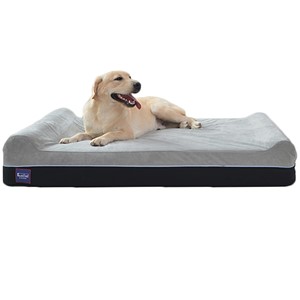
Laifug Large Grey Orthopedic Rectangle Bed
Price At Time of Publish $130.00
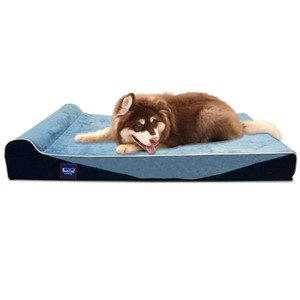
Laifug Large Blue Orthopedic Rectangle Bed
Price At Time of Publish $130.00 $110.00
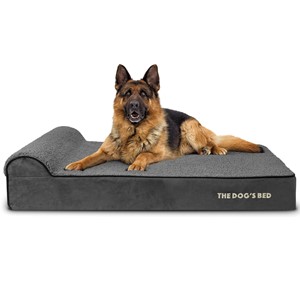
The Dogs Bed XL Grey Orthopedic Rectangle Bed
Price At Time of Publish $130.00 $185.00
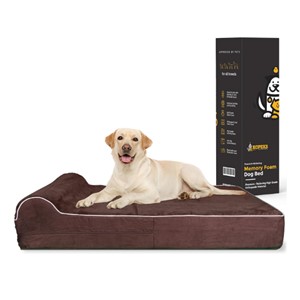
KOPEKS Jumbo Orthopedic Rectangular Bed
Price At Time of Publish $130.00 $110.00
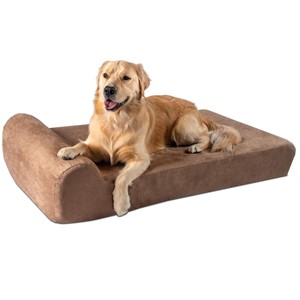
Big Barker XL Orthopedic Rectangle Bed
Price At Time of Publish $130.00 $240.00
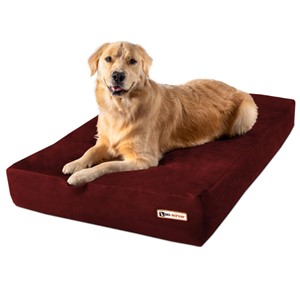
Big Barker XL Burgundy Orthopedic Rectangle Bed
Price At Time of Publish $130.00 $200.00
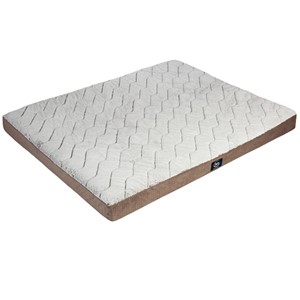
Serta XL Brown Orthopedic Rectangle Bed
Price At Time of Publish $130.00 $80.00
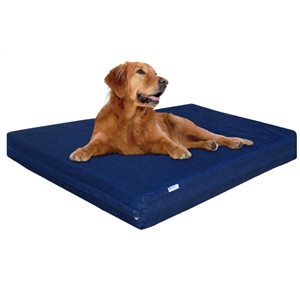
DogBed4Less XL Blue Orthopedic Rectangle Bed
Price At Time of Publish $130.00 $80.00
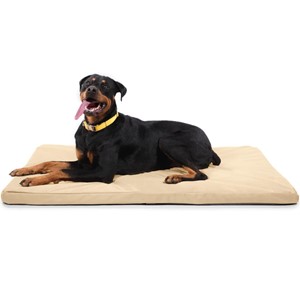
K9 Ballistics XL Sandstone Orthopedic Crate Pad
Price At Time of Publish $130.00 $159.00
Shop Bolster Dog Beds
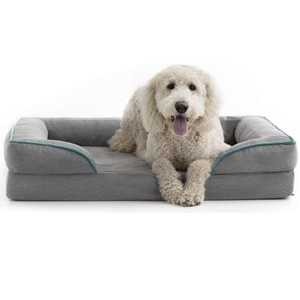
Brindle XL Gray Orthopedic Bolster Bed
Price At Time of Publish $130.00 $79.00
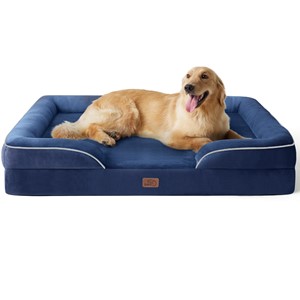
Bedsure XL Blue Orthopedic Bolster Bed
Price At Time of Publish $130.00 $76.00
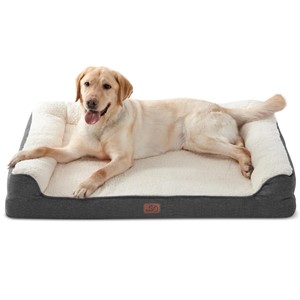
Bedsure XL Grey Orthopedic Bolster Bed
Price At Time of Publish $130.00 $60.00
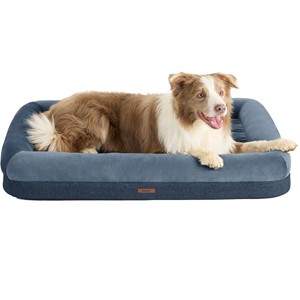
Lesure XL Navy Orthopedic Bolster Bed
Price At Time of Publish $130.00 $40.00
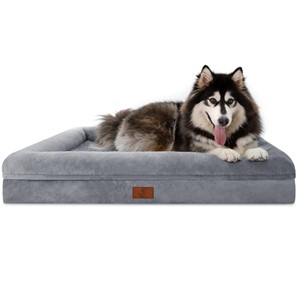
Yiruka XL Grey Orthopedic Bolster Bed
Price At Time of Publish $130.00 $55.00
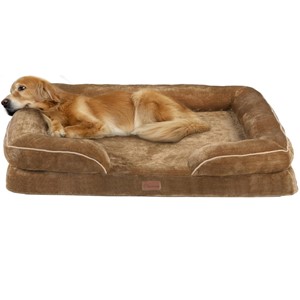
Yitahome XL Brown Orthopedic Bolster Bed
Price At Time of Publish $130.00 $37.00
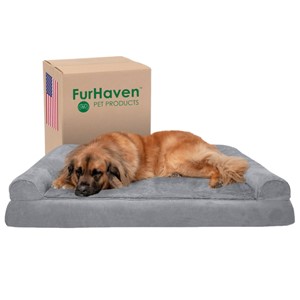
Furhaven XL Gray Orthopedic Bolster Bed
Price At Time of Publish $130.00 $130.00
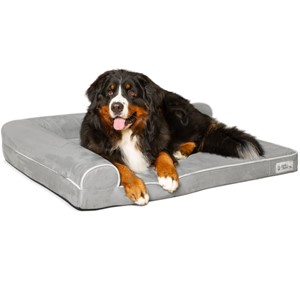
PetFusion XL Grey Orthopedic Bolster Bed
Price At Time of Publish $130.00 $60.00
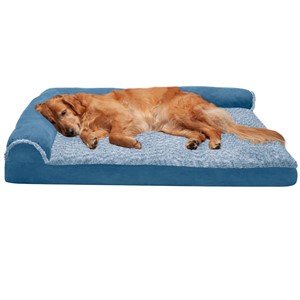
Furhaven Jumbo Blue Orthopedic Bolster Bed
Price At Time of Publish $130.00 $60.00
Shop Elevated Dog Beds
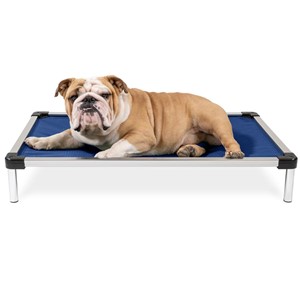
K9 Ballistics Chew Proof Elevated Small Bed
Price At Time of Publish $130.00 $129.00
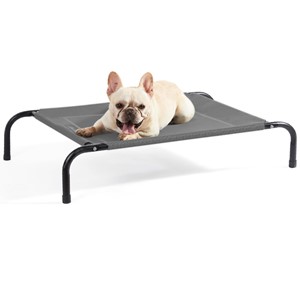
Bedsure Medium Elevated Dog Bed
Price At Time of Publish $130.00 $33.00
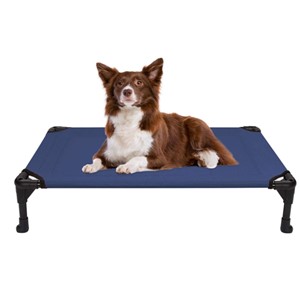
Veehoo Medium Elevated Dog Bed
Price At Time of Publish $130.00 $45.00
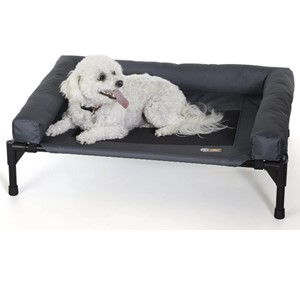
K&H Pet Products Elevated Bolster Dog Bed
Price At Time of Publish $130.00 $57.00
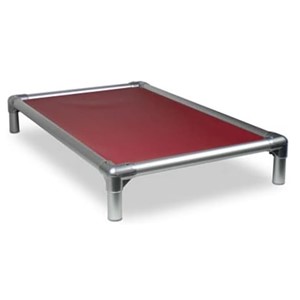
Kuranda Elevated Chew Proof Small Dog Bed
Price At Time of Publish $130.00 $134.00
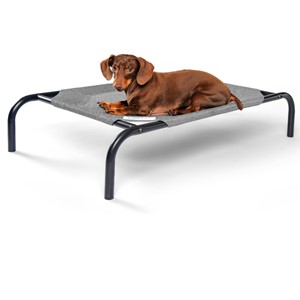
Coolaroo Small Elevated Dog Bed
Price At Time of Publish $130.00 $21.00
Related Articles
Below are some related articles that might be of interest to you. Just click or select a topic of interest and you will be taken to that page.
- Are Crates Bad for Dogs
- Best Healthy Dog Food Brands
- Christmas Presents for My Dog
- Dog Parasite Symptoms
- How To Clean Dog Beds
- Ingredients To Avoid In Dog Treats
- Puppy Proofing Your House
- Signs Your Dog Is Ill
- Using Alexa for Dog Behaviors
- When Should A Dog Bed Be Replaced
Go back to the Dog Luxury Beds home page.

